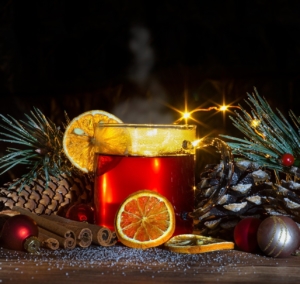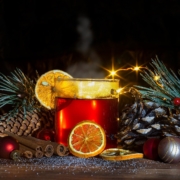Glugging glue wine as Christmas comes unstuck
 Don’t sniff, but are spicy Brits glugging glue this Christmas? Bountiful bottles of Glühwein selling from UK supermarket shelves might suggest people who come unstuck in extended isolation are reaching for a remedy or trying to put a broken Christmas back together, but in fact this import is the traditional German equivalent of mulled wine, also known as spiced wine, and has no known connection to glue. A humble red wine heated with cinnamon, cloves, allspice, nutmeg and even raisins is a widespread winter drink in Europe and nicely disposes of otherwise undrinkable dregs of cheap wine. Although traditionally this potion goes by different names in different lands, now in English it is flirting with a hot new name from abroad, and we are provisionally adding it to our growing list of German words used in English.
Don’t sniff, but are spicy Brits glugging glue this Christmas? Bountiful bottles of Glühwein selling from UK supermarket shelves might suggest people who come unstuck in extended isolation are reaching for a remedy or trying to put a broken Christmas back together, but in fact this import is the traditional German equivalent of mulled wine, also known as spiced wine, and has no known connection to glue. A humble red wine heated with cinnamon, cloves, allspice, nutmeg and even raisins is a widespread winter drink in Europe and nicely disposes of otherwise undrinkable dregs of cheap wine. Although traditionally this potion goes by different names in different lands, now in English it is flirting with a hot new name from abroad, and we are provisionally adding it to our growing list of German words used in English.
The English translation of Glühwein is literally Glow Wine, not just because it makes people glow, but because it was originally heated by dipping a hot iron rod into it, hopefully handled by a sober practitioner of this simple technical process. On the other hand, in English to mull something means to think it over, to ponder it or reflect on it. So is mulled wine a drink that has been allowed to sit and think, or one that has been carefully planned? Or, unlikely, one that causes reflection rather than merriment? The concise German word seems a snappier one and may become more mainstream in English, especially in the hands of merry marketers translating exotic appeal into profits – but could the opposite occur with mulled wine flowing into other languages? Surprisingly, in German the word Müll means rubbish. Gulp.




